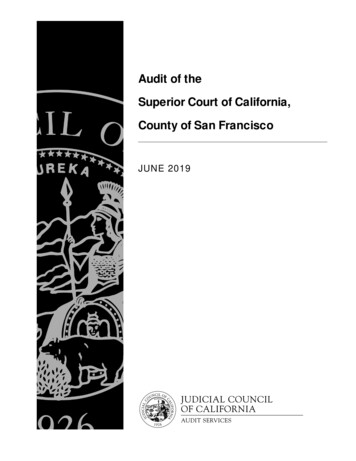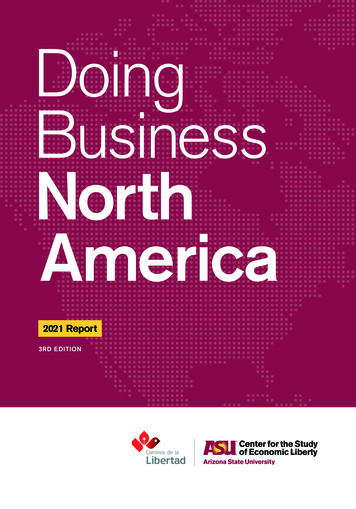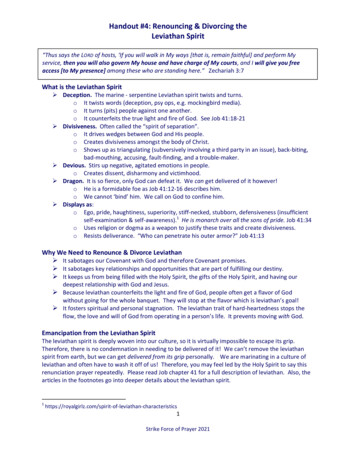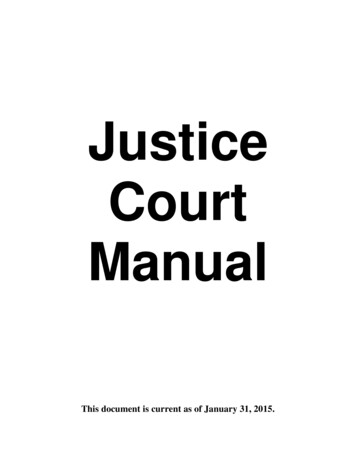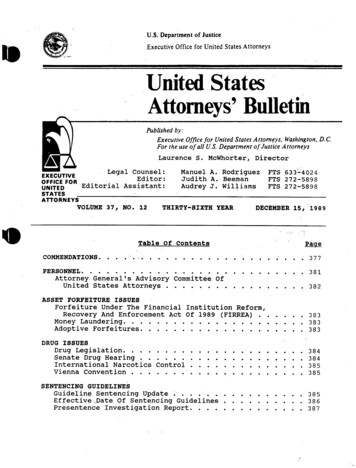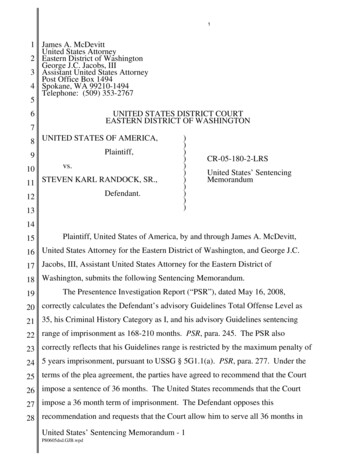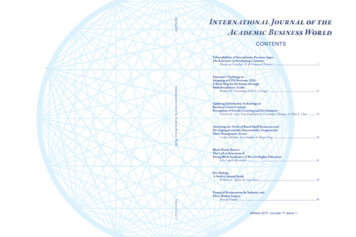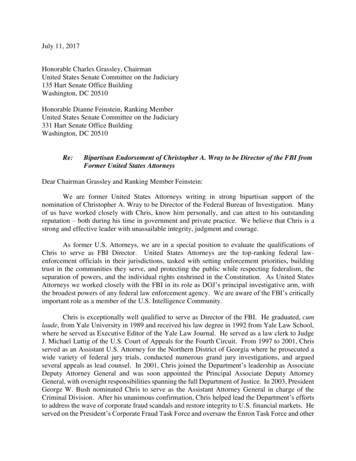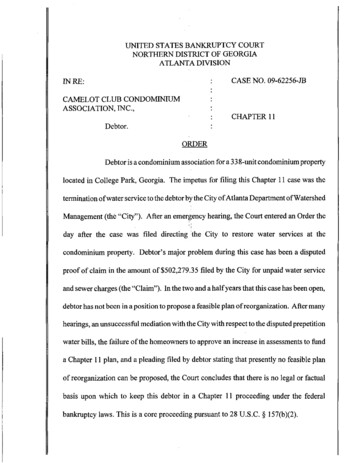
Transcription
UNITED STATES BANKRUPTCY COURTNORTHERN DISTRICT OF GEORGIAATLANTA DIVISIONCASE NO. N, INC.,CHAPTER 11Debtor.ORDERDebtor is a condominium association for a 338-unit condominium propertylocated in College Park, Georgia. The impetus for filing this Chapter 11 case was thetermination ofwater service to the debtor by the City ofAtlanta Department of WatershedManagement (the "City"). After an emergency hearing, the Court entered an Order the",day after the case was filed directing the City to restore water services at thecondominium property. Debtor's major problem during this case has been a disputedproof of claim in the amount of 502,279.35 filed by the City for unpaid water serviceand sewer charges (the "Claim"). In the two and a half years that this case has been open,debtor has not been in a position to propose a feasible plan of reorganization. After manyhearings, an unsuccessful mediation with the City with respect to the disputed prepetitionwater bills, the failure of the homeowners to approve an increase in assessments to funda Chapter II plan, and a pleading filed by debtor stating that presently no feasible planof reorganization can be proposed, the Court concludes that there is no legal or factualbasis upon which to keep this debtor in a Chapter II proceeding under the federalbankruptcy laws. This is a core proceeding pursuant to 28 U.S.C. § I 57(b)(2).
Given thetwo-and-a-half-year history ofthis case and the considerable timeand effort expended by many individuals in trying to reach a workable solution to thedispute between the debtor and the City, it is appropriate to recount the procedural historyof this case. In the first few months following the restoration of water services todebtor's premises, the United States Trustee filed two motions to dismiss this case andhas continuously maintained that there is no reasonable likelihood of reorganization. TheUnited States Trustee filed the first motion to dismiss on February 12,2009 and arguedat a hearing held on April I ,2009 that a Chapter 11 case was not feasible given debtor'sinsufficient monthly revenues. Counsel for the United States Trustee stated at thathearing that what the debtor needs is not a bankruptcy solution, but rather a politicalsolution with the City. The United States Trustee filed a second motion to dismiss, butchose not to pursue that motion because the debtor and the City agreed to attempt tomediate debtor's objection to the City'S Claim. In response to the compelling argumentsin both motions to dismiss, debtor's counsel repeatedly asked to keep the case open untildebtor could resolve the Claim with the City.At the request of the parties, the Court directed mediation on debtor'sobjection to the City's Claim by an Order entered on November 24, 2009. Althoughdebtor's counsel had indicated at a hearing held in this case in May of 20ID that themediation was proceeding and she was optimistic that a Chapter II plan or out-of-courtworkout with the City and other creditors would be proposed by the end of the summer2
of 2010, the Court heard nothing further from the parties. At a telephonic statusconference initiated by the Court on October 12, 20 I 0, counsel advised the Court that theparties appeared to be at a standstill. Counsel each described the difficulties they had atproving the prepetition amounts due and said that they were not yet clear on the dollaramount the City would accept and over what period of time the City would permit thedebtor to pay any agreed upon amount. It appeared that neither party was prepared tolitigate the debtor's objection to the City's Claim. The Court directed counsel for the Cityto confer with the city attorneys and the Commissioner to determine what amount theycould prove or what terms they could be willing to accept and to file a status report withinthirty (30) days of the telephonic conference. The Court gave debtor until January 1,2011 to file a proper plan of reorganization, if and only if a plan were appropriate andfeasible.The City filed a report on November 12, 2010 stating that the City hadsubmitted a proposal to the debtor concerning its Claim and payment terms. The reportindicated that the City was awaiting a response from the debtor's board and that counselfor the City would report to the Court on or before December 10, 2010 if no otherpleadings were filed by the parties concerning their dispute. The Court heard nothingfurther from the parties, and debtor did not file a Chapter 11 plan by January 1,2011.Because the case had been pending for over two (2) years and noconfirmable plan had been proposed, the Court entered an Order directing debtor to show3
cause why the case should not be dismissed at a hearing to be held on March 9, 2011.Debtor filed a response to the Order to Show Cause, attaching a draft plan ofreorganization, a draft disclosure statement, and a draft order resolving the City's Claim.However, these documents emphasized that the debtor and the City had not reached anydefinite agreement regarding the objection to the City's Claim and, significantly, thedocuments failed to disclose whether debtor would be able to generate sufficient revenueto fund any plan or pay the City's Claim.At the March 9, 2011 show cause hearing, debtor's counsel admitted thatin order for debtor to be able to fund a plan, its homeowners would need to approve anincrease in assessments at their annual homeowners' meeting, which counsel representedwould be held on April 30, 2011. The City and debtor's counsel announced the terms ofa proposed agreement, which would be presented to the homeowners at the April 30,2011 meeting. Essentially, under their agreement, the City's Claim would be in theamount of 350,000.00 to be paid in monthly installments of 5,000.00 for seventy (70)months, provided that debtor was able to confirm a plan of reorganization. When theCourt questioned the feasibility of a plan that would incorporate these terms, counselexplained that this agreement would require the homeowners to approve an increase inassociation dues. J Debtor requested additional time to file a Chapter 11 plan andAccording to the debtor's operating reports filed during this Chapter II case, in twenty (20) ofthe twenty-five (25) months for which debtor filed what appeared to be complete data, debtorcollected association dues in an amount less (many times, significantly less) than the amount ofassociation dues provided for in the monthly budget. In addition, debtor would not have had4
disclosure statement following the homeowners' meeting, and the Court instructed debtorto file a plan, iffeasible, by May 20, 2011.On April 12, 2011, debtor filed a motion to extend time to file a plan. Themotion indicated that debtor had been preparing for its April 30, 2011 homeowners'meeting and had planned on mailing notices to homeowners no later than April I, 2011,but that its plan was interrupted when a fire apparently arising from a domestic disputeoccurred on March 18, 2011. The fire completely destroyed one of debtor's fifteen (15)buildings. Because ofthe disruption caused by the fire, debtor's board was not able tosend out sufficient notice to homeowners for an annual meeting to be held on April 30,20 II. Therefore, debtor requested that the deadlines discussed at the March 9, 20 IIhearing be extended to allow debtor to hold its annual meeting on May 21,2011 and tohave a plan filed, iffeasible, no later than June 10,2011. The Court granted this request.On June 9, 2011- one day prior to the extended deadline for debtor to filea feasible plan - debtor filed a status report and request for additional time to file a plan.This report discussed several significant events that affected the viability of debtor'sChapter 11 case. First, debtor reported that another fire occurred on debtor's premisesduring the last week of April and, tragically, a mother and her young daughter died ofsmoke inhalation. As a result of this second fire, debtor's insurance carrier notifieddebtor that it would not renew coverage and only extended coverage from May 29, 2011sufficient income to cover operating expenses plus a 5,000.00 monthly payment to the Cityin twenty-one (21) of the twenty-five (25) months.5
to June 28, 2011. The report further stated that debtor was able to procure replacementinsurance coverage, but that debtor's insurance premium would increase from about 8,500.00 per month to just under 15,000.00 per month. Second, debtor reported thatthe annual homeowners' meeting was held on May 21, 2011 and that the homeowners didnot approve an increase in association dues of 50.00 per month. Third, debtor statedthat, due to the increased insurance premium, debtor would be unable to fund paymentsto the City under the terms announced at the March 9, 2011 hearing. Significantly, debtorindicated that it was investigating whether it was eligible for financing through a SmallBusiness Administration ("SBA") program. Ifit were able to obtain an SBA loan, debtorstated that it would be able to payoff the City's Claim, fund some projects such asinstalling meters that would allow for separate billing for each unit, and increase dues byan amount much smaller than 50.00 per month.The Court held a hearing on July 27,2011 on debtor's request for additionaltime to file a Chapter 11 plan. The request for more time was based on the representationthat debtor needed time to investigate its eligibility for an SBA loan. However, debtor'scounsel filed a pleading three (3) days before the hearing, stating that debtor haddetermined that it is not eligible for any SBA loans. Without the SBA financing andwithout the homeowners' approval of an increase in association dues, debtor stated thatno feasible plan of reorganization can be proposed. Given the history of this case andafter reviewing the recent pleadings filed, the Court advised the parties at the hearing that,6
unfortunately, it had no choice but to dismiss the case.The Court advised the debtor from the outset of this case and at mUltiplehearings that a condominium association makes an unlikely candidate for a successfulChapter II reorganization, because it generally has no mechanism for generating revenueother than the collection of association dues. Like many condominium associations intimes of financial crisis, this debtor has a number of members who are not paying or havenot paid their monthly dues. A delinquency in dues payments usually requires increasedassessments from paying members to cover association expenses and debt. However, thisdebtor has not been able to pass any increase in assessments or any special assessmentto fund a Chapter II plan. In fact, debtor's pleading filed on July 24, 2011 states that atthe annual homeowners' meeting held on May 21, 20 11, the homeowners were asked toapprove an increase in assessments that would generate between 6,000.00 and 7,000.00of additional revenue per month, but that homeowners "vehemently rejected anyadditional assessments to fund a plan, for any reason" and "made it clear that noadditional funding would be approved, regardless of how or what the plan proposed".When unit members cannot or refuse to pay dues, the condominiumassociation can try to exercise its rights under state law. However, debtor's July 24,20 IIpleading states that debtor lacks the funds to pursue delinquent homeowners unless anduntil the issues with the City can be managed. Furthermore, debtor states that althoughits board has approached attorneys, it has been unable to find a lawyer who will agree to7
provide collection services while debtor is in bankruptcy. Debtor's pleading states this"catch-22 situation" was explained to the homeowners at the May 21,2011 meeting, butthe increase in assessments was nevertheless rejected.The Court cannot keep a Chapter 11 case open indefinitely. Here, despitea great deal oftime and effort on the part of debtor's attorney, debtor's board, and severalunit holders, debtor has not been able to obtain a vote for an increase in assessments, hireattorneys to pursue delinquent homeowners, obtain financing through the SBA, orsuccessfully complete any other means of obtaining revenues sufficient to propose aChapter II plan to pay off the City's Claim or other filed claims. The problems identifiedby debtor's counsel that led to the bankruptcy filing and prevented the debtorcondominium association from proposing any feasible plan are not problems that can besolved in this bankruptcy proceeding. Perhaps the main benefit of a Chapter II filinghere was to require the City to restore water services in January of 2009 and to have timeto develop a plan to pay creditors. However, two and a half years later with no feasibleplan of reorganization and no hope of one being filed, this case must be and is herebydismissed. See 11 U.S.C. § I 112(b)(4)(A).The Court strongly encourages the parties to continue communicating withone another to reach a workable solution. Fortunately, the debtor is current on allpostpetition payments to the City, and all indications are that this debtor can continue topay its water bill going forward. Outside of bankruptcy, the City and creditors may8
pursue whatever state law rights they may have against the debtor, and the debtor maypursue collection remedies against homeowners who are delinquent in their associationdues.But the Court urges the debtor and its board to pursue discussions withhomeowners to increase the amount and collection of assessments. The Court urges theCity to consider the fact that it may have great difficulty in establishing and enforcing itsClaim against the 338 individual unit holders, all with different mortgage lenders. Thedebtor condominium association may not have assets against which the City can enforceits Claim, and shutting off the water service would harm innocent unit holders who havepaid their dues every month. The Court encourages the City to recognize the benefit ofhaving a paying customer with a solid two-and-a-half-year record of monthly payments,to explore the possibility of installing meters that would allow for separate billing foreach unit, to refrain from shutting off water services to the debtor, and to meet with thedebtor's representatives to work toward a resolution of any past due claim in an amountthis debtor condominium association can reasonably pay.IT IS SO ORDERED, this3!.day of August, 2011.o9BlHARYITED STATES BANKRUPTCY JUDGE
CERTIFICATE OF MAILINGA copy of the foregoing Order was mailed to the following:Lydia Hilton2625 Piedmont Road, Suite 56-297Atlanta, GA 30324Lydia HiltonPerrotta Cahn & Prieto PCSuite 3250950 East Paces Ferry Rd.Atlanta, GA 30324Camelot Club CondominiumAssociation, Inc.Attn: President5655 Old National HighwayCollege Park, GA 30349Theresa StewartCity of Atlanta Department of Law68 Mitchell Street, SW, Suite 4100Atlanta, GA 30303-3250Stephen BlockLevine, Block & Strickland, LLP780 Johnson Ferry RoadSuite 240Atlanta, GA 30342Martin DchsDavid WeidenbaumOffice ofthe U.S. Trustee362 Richard Russell Federal Bldg.75 Spring Street, SWAtlanta, GA 30303Judicial Assistant forChief Judge BiharyMark Yankson1408 Camelot Dr.College Park, GA 3034910
Debtor is a condominium association for a 338-unit condominium property located in College Park, Georgia. The impetus for filing this Chapter 11 case was the termination of water service to the debtor by the City of Atlanta Department of Watershed Management (the "City"). After an emergency hearing, the Court entered an Order the " ,

